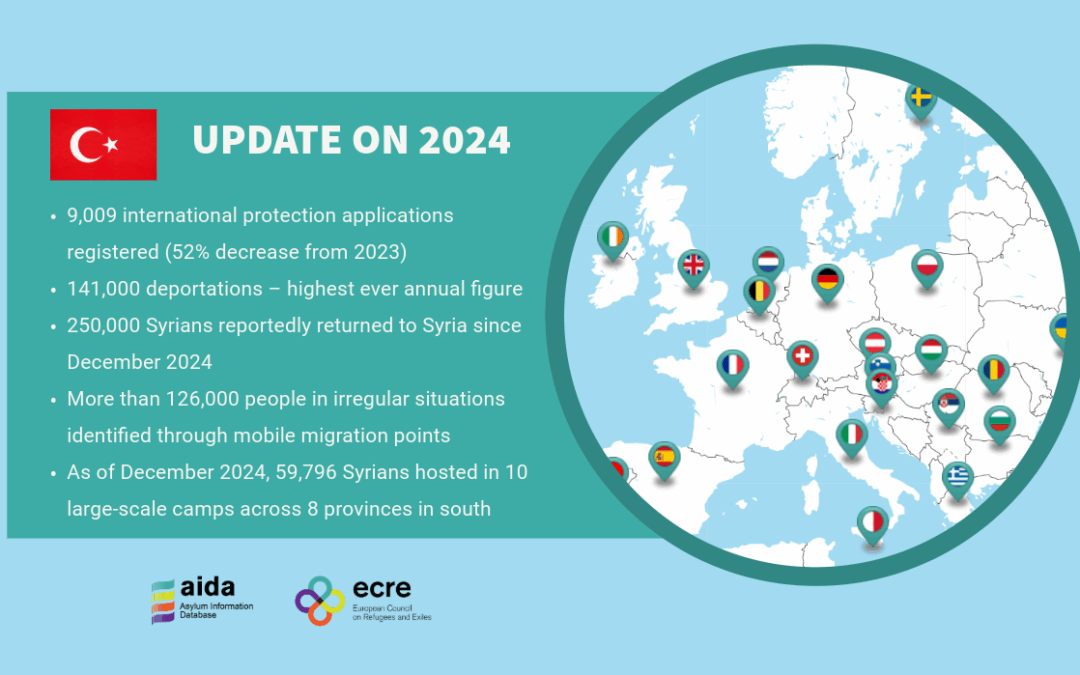The updated AIDA Country Report on Türkiye provides a detailed overview on legislative and practice-related developments in asylum procedures, reception conditions, detention of asylum applicants and content of international protection in 2024. It also includes a section on temporary protection.
A number of key developments drawn from the overview of the main changes that have taken place since the publication of the update on 2023 are set out below.
- Country context: In 2024, Türkiye hosted over 2.9 million Syrians under temporary protection and nearly 195,000 asylum applicants and protection beneficiaries from other countries, primarily Afghanistan, Iraq and Iran. Although the overall refugee population remained significant, several policy developments and external events, including increased deactivations of protection statuses, heightened anti-refugee sentiment and restrictions on registration, further deteriorated access to protection. There were also numerous reports of the arbitrary cancellation of identity documents, a lack of legal remedies and obstacles to lodging appeals. As a result, many people who arrived in Türkiye opted for irregular onward movement due to lack of prospects and prolonged legal uncertainty. The political transition in Syria following the fall of the Assad regime marked a turning point with around 250,000 Syrians reported to have returned, although the voluntary nature of these returns is contested.
(A) International protection
Asylum Procedure
- Asylum statistics: Türkiye registered 9,009 international protection applications in 2024, a 52% decrease compared to 2023 and the sharpest decline since 2014. The largest groups of applicants were Afghans (5,550), Iraqis (1,881) and Iranians (784). Meanwhile, 225,831 people (mostly Afghans and Syrians) in an irregular situation were apprehended in 2024.
- Border control and returns: The increased militarisation of borders, including the construction of patrol roads and surveillance infrastructure, resulted in 104,000 prevented entries, while pushbacks – particularly of single Afghan men – continued at the Iranian border.
- Registration: Registration for international protection remained challenging in 2024, especially in provinces with large foreign populations. In addition, address verifications often led to the deactivation of identity documents which in turn pushed many people into irregularity.
- Voluntary return and deportations: Approximately 250,000 Syrians reportedly have returned to their country of origin since December 2024. While national authorities presented these returns as “voluntary, safe, dignified, and regular”, stakeholders working at the national level have questioned whether these returns were genuinely voluntary. There were 141,000 deportations in 2024 – the highest number to date – and they often involved pressure to sign voluntary return forms and disregard for ongoing legal procedures.
- Mobile migration points: Over 1.18 million people were checked at mobile points which were expanded nationwide and over 126,000 people were identified as being in situations of irregularity. The use of these checks resulted in reticence among people with inactive or cancelled identity documents to access essential services.
- Asylum decisions and appeals: A total of 85,125 asylum decisions were taken in 2024. Although no public data is available, stakeholders have reported that rejection rates were considerably higher than acceptance rates. According to national stakeholders, securing positive rulings in front of national courts is also difficult, especially in cases involving detention. Regardless, courts did annul some deportations, citing ongoing crises (e.g. Gaza, Afghanistan).
Reception conditions
- From “satellite cities” to “provinces of residence”: The former “satellite cities” concept was fully replaced by the “province of residence” system in 2024 with 62 provinces mostly closed to new registrations.
- Funding: In September 2023, the EU and Türkiye signed a €781 million agreement to extend the Emergency Social Safety Net for vulnerable refugees. This has brought total EU aid since 2011 to almost €10 billion. Despite this, thousands of people remained undocumented or excluded from reception due to registration barriers or legal status issues.
Detention of asylum applicants
- Detention capacity and conditions: In 2024, 32 removal centres with a combined capacity of 18,780 operated across 25 provinces. There were widespread reports of coercive returns, abuse and poor conditions. Sudden and unnotified transfers between centres also created barriers to legal representation as lawyers struggled to locate their clients.
Content of international protection
- Anti-migrant sentiment: Anti-migrant sentiment intensified during and after the 2024 municipal elections, with violent anti-Syrian riots in Kayseri further exacerbating insecurity.
- Resettlement: The United Nations Refugee Agency (UNHCR) resettled more than 6,800 refugees in 2024. The resettled people were mainly Syrians from earthquake-affected areas.
(B) Temporary protection
- Temporary accommodation centres: Following a 2022 policy change, temporary accommodation centres became de facto detention centres, especially for Syrians with revoked status or pending registration. Detainees face indefinite detention, with some centres (e.g. Kilis Elbeyli) reportedly using cold storage rooms and physical abuse against detainees.
- Apprehensions of Syrian nationals: 50,641 Syrians were apprehended in 2024 due to their irregular stays. Although this represented a decrease compared to 2023, it was more than double the 2021 figure.
- EU-Türkiye resettlement scheme: As of March 2024, 65,927 Syrians have been resettled under the EU-Türkiye “1:1” resettlement scheme.
- Accommodation: As of December 2024, 59,796 Syrians were residing in ten large-scale camps across eight provinces in the south of the country.
The full report is available here.
For more information about the AIDA database or to read other AIDA reports, please visit the AIDA website.

